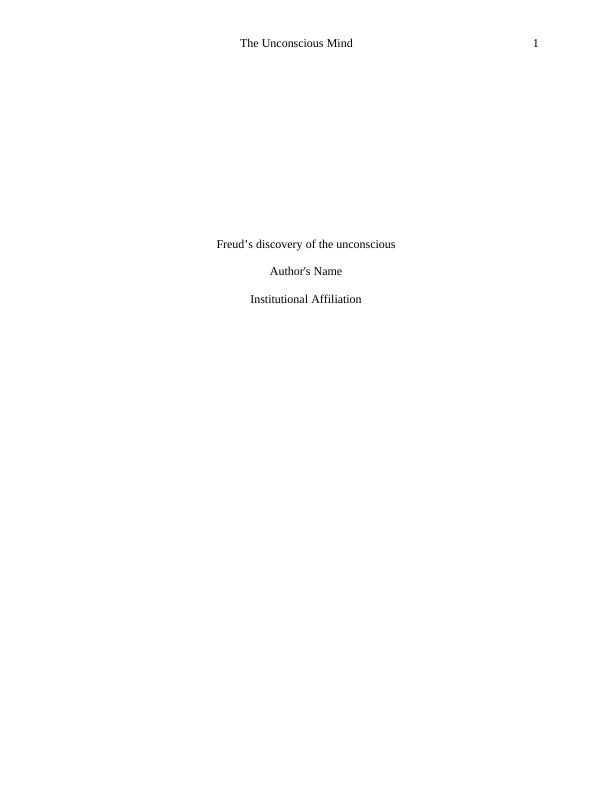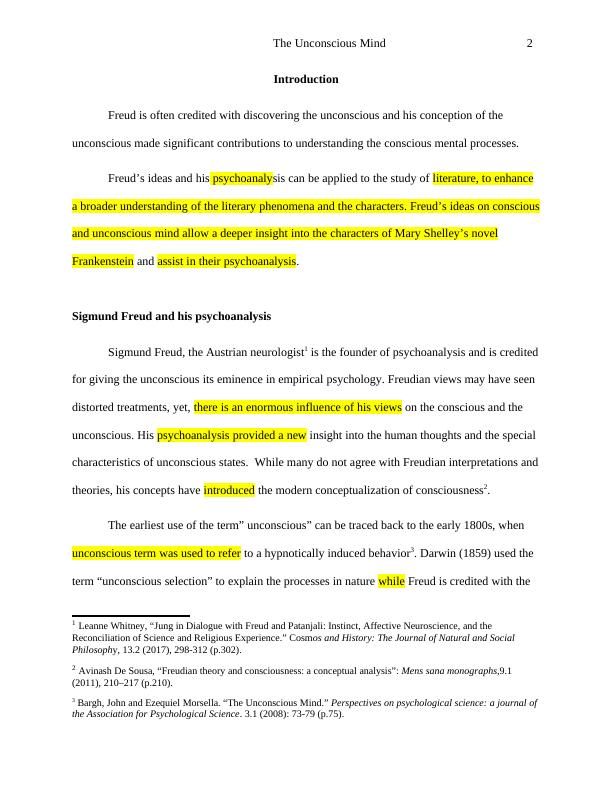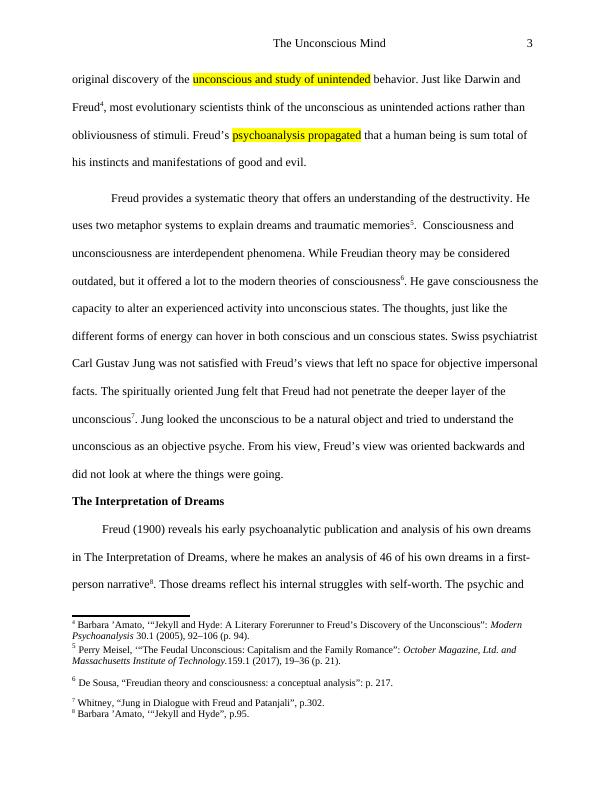The Unconscious Mind: Freud's Discovery and its Application to Literature
Added on 2022-12-27
9 Pages2777 Words193 Views
The Unconscious Mind 1
Freud’s discovery of the unconscious
Author's Name
Institutional Affiliation
Freud’s discovery of the unconscious
Author's Name
Institutional Affiliation

The Unconscious Mind 2
Introduction
Freud is often credited with discovering the unconscious and his conception of the
unconscious made significant contributions to understanding the conscious mental processes.
Freud’s ideas and his psychoanalysis can be applied to the study of literature, to enhance
a broader understanding of the literary phenomena and the characters. Freud’s ideas on conscious
and unconscious mind allow a deeper insight into the characters of Mary Shelley’s novel
Frankenstein and assist in their psychoanalysis.
Sigmund Freud and his psychoanalysis
Sigmund Freud, the Austrian neurologist1 is the founder of psychoanalysis and is credited
for giving the unconscious its eminence in empirical psychology. Freudian views may have seen
distorted treatments, yet, there is an enormous influence of his views on the conscious and the
unconscious. His psychoanalysis provided a new insight into the human thoughts and the special
characteristics of unconscious states. While many do not agree with Freudian interpretations and
theories, his concepts have introduced the modern conceptualization of consciousness2.
The earliest use of the term” unconscious” can be traced back to the early 1800s, when
unconscious term was used to refer to a hypnotically induced behavior3. Darwin (1859) used the
term “unconscious selection” to explain the processes in nature while Freud is credited with the
1 Leanne Whitney, “Jung in Dialogue with Freud and Patanjali: Instinct, Affective Neuroscience, and the
Reconciliation of Science and Religious Experience.” Cosmos and History: The Journal of Natural and Social
Philosophy, 13.2 (2017), 298-312 (p.302).
2 Avinash De Sousa, “Freudian theory and consciousness: a conceptual analysis”: Mens sana monographs,9.1
(2011), 210–217 (p.210).
3 Bargh, John and Ezequiel Morsella. “The Unconscious Mind.” Perspectives on psychological science: a journal of
the Association for Psychological Science. 3.1 (2008): 73-79 (p.75).
Introduction
Freud is often credited with discovering the unconscious and his conception of the
unconscious made significant contributions to understanding the conscious mental processes.
Freud’s ideas and his psychoanalysis can be applied to the study of literature, to enhance
a broader understanding of the literary phenomena and the characters. Freud’s ideas on conscious
and unconscious mind allow a deeper insight into the characters of Mary Shelley’s novel
Frankenstein and assist in their psychoanalysis.
Sigmund Freud and his psychoanalysis
Sigmund Freud, the Austrian neurologist1 is the founder of psychoanalysis and is credited
for giving the unconscious its eminence in empirical psychology. Freudian views may have seen
distorted treatments, yet, there is an enormous influence of his views on the conscious and the
unconscious. His psychoanalysis provided a new insight into the human thoughts and the special
characteristics of unconscious states. While many do not agree with Freudian interpretations and
theories, his concepts have introduced the modern conceptualization of consciousness2.
The earliest use of the term” unconscious” can be traced back to the early 1800s, when
unconscious term was used to refer to a hypnotically induced behavior3. Darwin (1859) used the
term “unconscious selection” to explain the processes in nature while Freud is credited with the
1 Leanne Whitney, “Jung in Dialogue with Freud and Patanjali: Instinct, Affective Neuroscience, and the
Reconciliation of Science and Religious Experience.” Cosmos and History: The Journal of Natural and Social
Philosophy, 13.2 (2017), 298-312 (p.302).
2 Avinash De Sousa, “Freudian theory and consciousness: a conceptual analysis”: Mens sana monographs,9.1
(2011), 210–217 (p.210).
3 Bargh, John and Ezequiel Morsella. “The Unconscious Mind.” Perspectives on psychological science: a journal of
the Association for Psychological Science. 3.1 (2008): 73-79 (p.75).

The Unconscious Mind 3
original discovery of the unconscious and study of unintended behavior. Just like Darwin and
Freud4, most evolutionary scientists think of the unconscious as unintended actions rather than
obliviousness of stimuli. Freud’s psychoanalysis propagated that a human being is sum total of
his instincts and manifestations of good and evil.
Freud provides a systematic theory that offers an understanding of the destructivity. He
uses two metaphor systems to explain dreams and traumatic memories5. Consciousness and
unconsciousness are interdependent phenomena. While Freudian theory may be considered
outdated, but it offered a lot to the modern theories of consciousness6. He gave consciousness the
capacity to alter an experienced activity into unconscious states. The thoughts, just like the
different forms of energy can hover in both conscious and un conscious states. Swiss psychiatrist
Carl Gustav Jung was not satisfied with Freud’s views that left no space for objective impersonal
facts. The spiritually oriented Jung felt that Freud had not penetrate the deeper layer of the
unconscious7. Jung looked the unconscious to be a natural object and tried to understand the
unconscious as an objective psyche. From his view, Freud’s view was oriented backwards and
did not look at where the things were going.
The Interpretation of Dreams
Freud (1900) reveals his early psychoanalytic publication and analysis of his own dreams
in The Interpretation of Dreams, where he makes an analysis of 46 of his own dreams in a first-
person narrative8. Those dreams reflect his internal struggles with self-worth. The psychic and
4 Barbara ’Amato, ‘“Jekyll and Hyde: A Literary Forerunner to Freud’s Discovery of the Unconscious”: Modern
Psychoanalysis 30.1 (2005), 92–106 (p. 94).
5 Perry Meisel, ‘“The Feudal Unconscious: Capitalism and the Family Romance”: October Magazine, Ltd. and
Massachusetts Institute of Technology.159.1 (2017), 19–36 (p. 21).
6 De Sousa, “Freudian theory and consciousness: a conceptual analysis”: p. 217.
7 Whitney, “Jung in Dialogue with Freud and Patanjali”, p.302.
8 Barbara ’Amato, ‘“Jekyll and Hyde”, p.95.
original discovery of the unconscious and study of unintended behavior. Just like Darwin and
Freud4, most evolutionary scientists think of the unconscious as unintended actions rather than
obliviousness of stimuli. Freud’s psychoanalysis propagated that a human being is sum total of
his instincts and manifestations of good and evil.
Freud provides a systematic theory that offers an understanding of the destructivity. He
uses two metaphor systems to explain dreams and traumatic memories5. Consciousness and
unconsciousness are interdependent phenomena. While Freudian theory may be considered
outdated, but it offered a lot to the modern theories of consciousness6. He gave consciousness the
capacity to alter an experienced activity into unconscious states. The thoughts, just like the
different forms of energy can hover in both conscious and un conscious states. Swiss psychiatrist
Carl Gustav Jung was not satisfied with Freud’s views that left no space for objective impersonal
facts. The spiritually oriented Jung felt that Freud had not penetrate the deeper layer of the
unconscious7. Jung looked the unconscious to be a natural object and tried to understand the
unconscious as an objective psyche. From his view, Freud’s view was oriented backwards and
did not look at where the things were going.
The Interpretation of Dreams
Freud (1900) reveals his early psychoanalytic publication and analysis of his own dreams
in The Interpretation of Dreams, where he makes an analysis of 46 of his own dreams in a first-
person narrative8. Those dreams reflect his internal struggles with self-worth. The psychic and
4 Barbara ’Amato, ‘“Jekyll and Hyde: A Literary Forerunner to Freud’s Discovery of the Unconscious”: Modern
Psychoanalysis 30.1 (2005), 92–106 (p. 94).
5 Perry Meisel, ‘“The Feudal Unconscious: Capitalism and the Family Romance”: October Magazine, Ltd. and
Massachusetts Institute of Technology.159.1 (2017), 19–36 (p. 21).
6 De Sousa, “Freudian theory and consciousness: a conceptual analysis”: p. 217.
7 Whitney, “Jung in Dialogue with Freud and Patanjali”, p.302.
8 Barbara ’Amato, ‘“Jekyll and Hyde”, p.95.

End of preview
Want to access all the pages? Upload your documents or become a member.
Related Documents
Assignments | Introduction to Psychologylg...
|8
|2514
|332
KLEIN'S AND WINNICOTT'S THEORIESlg...
|14
|3620
|55
Research Article Clinical Reasoning 846487lg...
|20
|10204
|8
